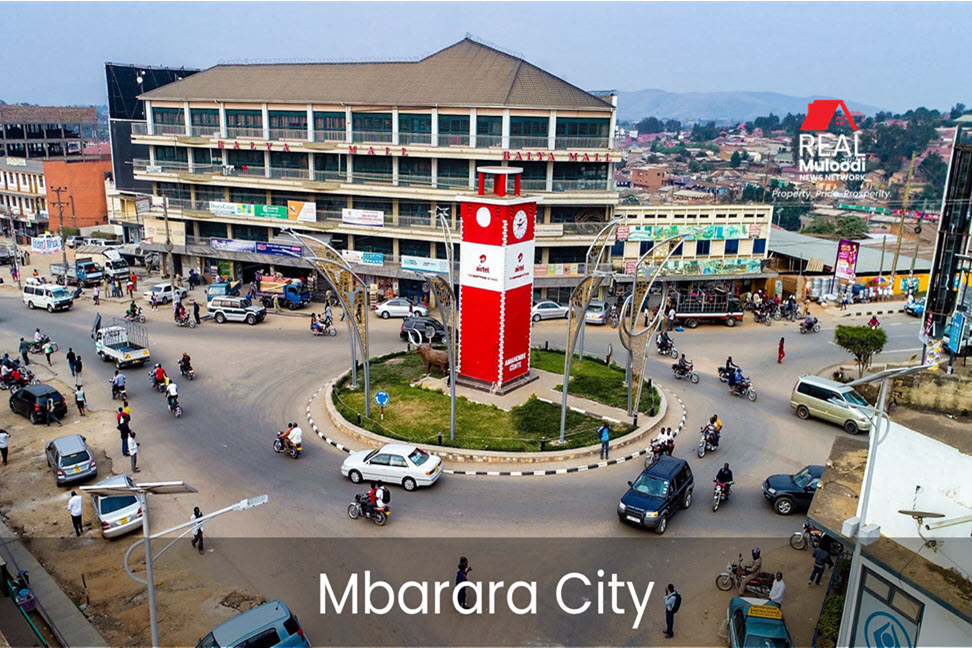UGANDA, Mbarara | Real Muloodi News | Mbarara City attained it’s official city status on July 1, 2020. Other municipalities that also attained city status include Hoima, Fort Portal, Mbale, Arua, Jinja, Masaka, Soroti and Lira.
The designation of City status attracts investment and business growth, thereby providing a boost to local communities and opening up new opportunities for the people who live there.
“Cities have the potential to propel growth, thereby attracting capital, spurring innovation, providing higher productivity jobs. Services can be provided more cost-effectively, improving access for all,” says Somik Lall, World Bank Lead Urban Economist for Africa.
Mbarara’s attainment of city status has attracted many newcomers to the city. The increased interest to invest there has lead to a real estate boom. As a result, land prices in and around the city have skyrocketed.
The Head of Operations at Amity Realtors, Herbert Tushabe, says the price of a plot of land within 5-10 kilometres from the city centre has more than doubled in the past two years. He also notes that due to increased demand, such land is now becoming scarce.
Tushabe says that in some areas, a plot of land measuring 100×50 ft within a 5-10 kilometre radius that used to go for USh3.5m now costs between USh10m and USh15m.
Whereas land in places about 15 kilometres out from the city centre now costs USh10m, yet initially such land cost as little as USh2m.
He says that a commercial plot of 25×50 ft which used to cost USh50m now costs between USh100m and USh200m while a residential plot measuring 30×40 ft now costs USh50m.
He adds that the increase in land prices is because of high demand as many people who live within the city are making plans to build and live in the suburban areas as the city continues to develop.
Tushabe emphasises that Mbarara is developing fast in businesses, making it a commercial hub for the region.
However, landowners and brokers say there is a lack of infrastructure in form of rental houses.
According to Tushabe, investors are scared of constructing rentals because the actual occupancy population is smaller than the working population that is seen during the day. Many people go back to their homes in neighbouring districts like Isigiro, Bwampira, Bushenyi, and Sheema, which are within 30 kilometres.
Alex Musiime, also a real estate dealer, blames the slow infrastructure development in Mbarara City on the lack of industries that would attract the population to stay.
Musiime and Tushabe agree that the rate at which people buy land and the doubled land prices do not match the development rate.
In the last 20 months, they have sold several plots of land, but it is costly to develop them due to the increase in construction material prices and the low occupancy rate.
“Over 50 acres of land we sold in the last 20 months, when you go back after 3, 4 or 5 months, there is no development, and it concerns us. When you ask people what is stopping them from developing, why they are piling up plots, they tell you they don’t have money. The cost of developing is so high, so they keep the money and wait for when land appreciates so that they can resell it. If they develop, the occupancy rates are low,” said Musiime.
Alex Tuyramusiima, a real estate broker, says the increase in property rates in Mbarara City has also affected land prices in neighbouring districts such as Bushenyi and Ntungamo, where an acreage of land now goes between USh25m and USh30m, up from USh10m. The rates in Isingiro and Kiruhura now go between USh10m and USh20m.
Land brokers say that the lack of industries and infrastructure, like rental houses, also affects the huge land sales.
Turyamusiima adds that because of the low occupancy rate, rental charges have also increased. A single self-contained room currently goes for USh150,000, up from USh100,000, and a double self-contained goes for USh250,000, up from USh200,000.
Anthony Asiimwe, a surveyor, attributes the increase in land prices to the numerous people born in the Western region but had built-in Kampala, the capital city. They are now returning after the effects of the Covid-19 lockdown.
READ MORE LIKE THIS:



